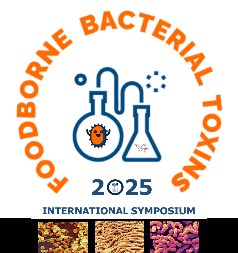Foodborne Bacterial Toxins International Symposium (FBTIS)
Jacques-Antoine Hennekinne
Jacques-Antoine Hennekinne
PhD in food microbiology, INA-PG, Paris (FR). 2009
He works at the French agency for food, occupational health and safety as deputy scientific director since December 2020. In parallel, he manages the Staphylococci, Bacillus and Clostridium unit in this laboratory since January 2014. He is the director of the European Union Reference Laboratory for Coagulase Positive Staphylococci (EURL for CPS) and deputy head of the National Reference Laboratory for CPS. He took part in standardization activities as project leader for the development of the EN ISO 19020 under the CEN M381 mandate (2011-2016), was the chairman of the ISO TC34 SC9 (2018-2020) and is currently the project leader of the ISO NP 16140-9 (validation of alternative methods for bacterial toxins and biogenic amines in food) under the ISO TC34 SC9 WG3 responsibility.
Finally, he is involved in French and EU projects as participant or coordinator to develop/transfer and promote tools to characterize bacterial toxins.
Laurent LALOUX
LALOUX Laurent
Food safety laboratory manager
ANSES - French Agency for Food, Environmental and Occupational Health & Safety
Laboratory for Food safety, Maisons-Alfort and Boulogne-Sur-Mer locations
14, rue Pierre et Marie Curie, F-94701 Maisons-Alfort Cedex
After obtaining a Master of Food science and Engineering from the Institute of Technology for Life, Food and Environmental Sciences (AgroParisTech) in Paris, Laurent LALOUX was in charge in 1991 of a scientific Unit on Quality and Hygiene of Dairy Products in the National veterinary and food study center (CNEVA).
In 1998, this center was merged to the French Agency for Food Safety (AFSSA) where he was involved in the scientific steering of a team of 28 engineers, scientists and technicians working on composition, nutrition, hygiene, microbiology and sensory analysis of dairy products.
In this role, he developed a strong expertise in international or European committees; Member of the French delegation to the Codex Alimentarius Committee on Milk and Milk Products, member or president of several expert groups from three joint standardization bodies IDF/ISO/AOAC, member of the French delegation to the European Union, Directorate-General for Agriculture, DG VI, expert group "milk and milk products', Expert at the European Court of Auditors in analytical disputes in the context of commercial transactions.
Since 2007, he is head of the laboratory for food safety, French Agency for Food, Environmental and Occupational Health & Safety, in Maisons-Alfort (Paris area) and Boulogne-Sur-Mer (in the North of the country, first French economic center for seafood), managing a lab of 140 people involved in food safety, detection, epidemiology and monitoring of food biological and chemical hazards; Bacteria, viruses, parasites, toxins, pesticides, heavy metals, microplastics and nanomaterials.
In particular, the laboratory hosts many reference laboratory mandates at National (13) and European level (2). The laboratory is the European Union Reference Laboratories "Listeria monocytogenes" and "Coagulase Positive Staphylococcus" for EC DG Health.
Dr Bertrand LOMBARD
Dr Bertrand LOMBARD, PhD, coordinates reference activities within the ANSES directorate steering the activities of the 9 laboratories, after 20 years at the Laboratory for food safety, where he was in particular responsible for up to 3 EURL mandates. He conducted his PhD works on inter-laboratory studies to validate methods and to assess laboratory performance in the field of food microbiology. From 2001 to 2017 and from 2021, he has chaired/chairs ISO/TC 34/SC 9, the ISO committee in charge of standardization in the field of microbiological analysis in the food chain. He also convenes since 2005 its WG 2 ensuring statistical expertise for the standardization works in this area. He has developed an expertise on method validation and measurement uncertainty, as well as on the organisation of proficiency testing in food microbiology.
Fabrizio Anniballi

Dr Fabrizio Anniballi is a food technologist responsible for the Italian National Reference Centre for Botulism at the Istituto Superiore di Sanità and coordinates the National Botulism Surveillance System. Fabrizio is also a member of the EFSA Network on Microbiological Risk Assessment and the ECEC Operational Contact Point for Botulism, as well as several ISO and UNI working groups that address the development and validation of methods and management systems in food safety. He has been appointed as an expert on CBRNe agents for the United Nations Office for Disarmament Affairs. He has conducted studies on the development and validation of rapid and alternative methods for botulinum neurotoxins, on the genomic characterisation of BoNT-producing clostridia, and on mechanisms to mitigate the risk of botulism, including bio-competition and the use of bio-preservatives.
Monika Ehling-Schulz
Monika Ehling-Schulz, Head of the Center for Pathobiology and Head of the Institute of Microbiology at the Vetmeduni Vienna, Austria, is internationally renowned for her work on toxigenic Bacilli. Her team has identified key regulators that orchestrate virulence in B. cereus. In 2016, she was awarded the Otto von Guericke Prize for her groundbreaking work on emetic Bacillus cereus, which opens new avenues for next-generation risk-based diagnostics. With her team, she successfully applied AI-assisted FTIR spectroscopy at the interface of food safety and veterinary medicine as part of a One Health concept. She is an elected Fellow of the European Academy of Microbiology (EAM), a board member of the Society of Microbiology and Preventive Medicine (ÖGHMP), and Austrian delegate to the Expert Committee on Microbiology of the Food Chain.
Tentative Title:
From Taxonomy to Risk: Differential Bacillus cereus diagnostics.
Sophia Johler
Prof. Sophia Johler is the Chair of Food Microbiology at LMU Munich. Her main research interests are foodborne intoxications, stress response, and the use of -omics and artificial intelligence in microbial risk analysis. She served as President of the Swiss Society for Food Hygiene and member of the board of the European College of Veterinary Public Health. She is also Editor-in-Chief of the International Journal of Food Microbiology.
Tentative title:
“A fresh take on an old foe - foodborne bacterial toxins"
Organization Committee

LALOUX Laurent Honorary Chair (Food safety Laboratory Director, Anses)
NIA Yacine Chair of FBTIS Symposium (Anses)
HENNEKINNE Jacques-Antoine Deputy Chairperson of FBTIS symposium (Anses)
FATIHI Abdelhak (Anses)
DELORME Catherine (Anses)
VINGADASSALON Noémie (Anses)
BOSTON Alexandra (Anses)
BOUZEMBRAK Sarah (Anses)
OSMANI Yacine (Anses)
ZUCCON Fabio (IZS PLV/sponsor)
FEDERIGHI Michel (ENVA/SFM sponsor)
RAJKOVIC Andreja (ICFMH/UGent, Belgium sponsor, )
DICORIS (UCEE)
Registrations
|
Registration Type |
Early Fee |
Late Fee |
|
Regular registration |
350 € |
450 € |
|
Student registration |
250 € |
350 € |
For Student registrations, a valid proof of status should be presented. You have to send it with the registration form to the address: FBTIS@anses.fr.
Registration fee includes:
Access to all scientific sessions
Access to the exhibition & poster area
Welcome Reception
Coffee Break and Lunch at the Conference Venue
Free access to the social event
How to register ?
Registrations can only be submitted through the registration form.
A confirmation email will be sent to all validated registrations 48h after receiving the registration form.
An invoice will be edited and sent to you.
The invoice can be paid by bankcard or bank transfer.
Please note that the number of participant is limited; first come, first served.
Terms and Conditions
The registration fees do not include insurance of participants against accidents, sickness, cancellation, theft, property loss or damage. Participants are advised to take out adequate personal insurance.
Registration implies acceptance of the congress rules and its conditions of participation and cancellation.
The Organizers of the FBTIS symposium reserve the right to limit the capacity of the in-person Conference due to the need to ensure the health and safety of attendees, in accordance with the recommendations
of the World Health Organization, Health (WHO) and local Health Authorities, at the time of the Conference.
Conference registration is personal and non-transferable.
Cancellations will not be entitled to a refund excepted in specific and fully justified cases.
Check that all the information necessary for reimbursement by your employer is available in the registration form